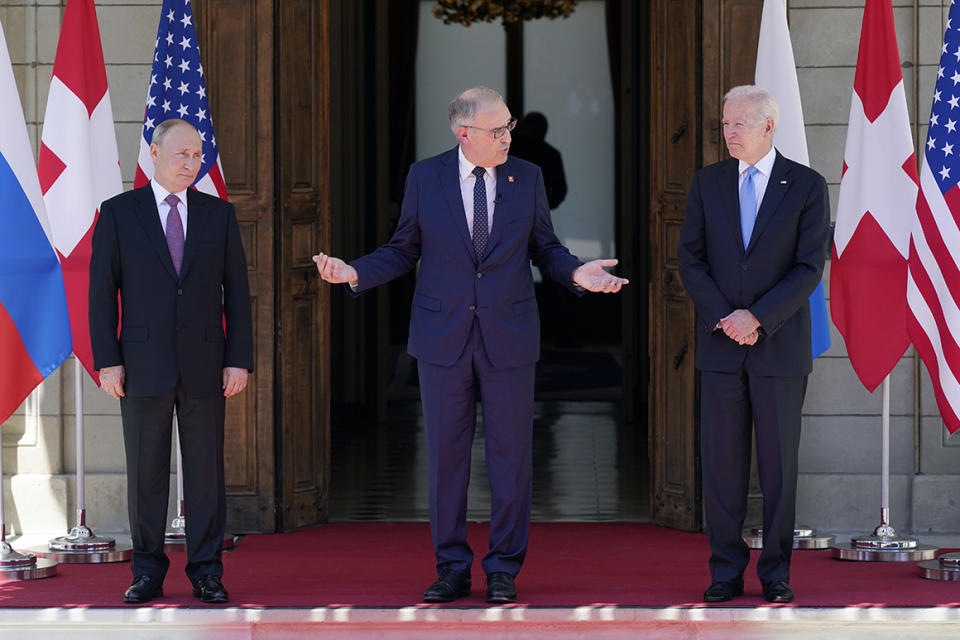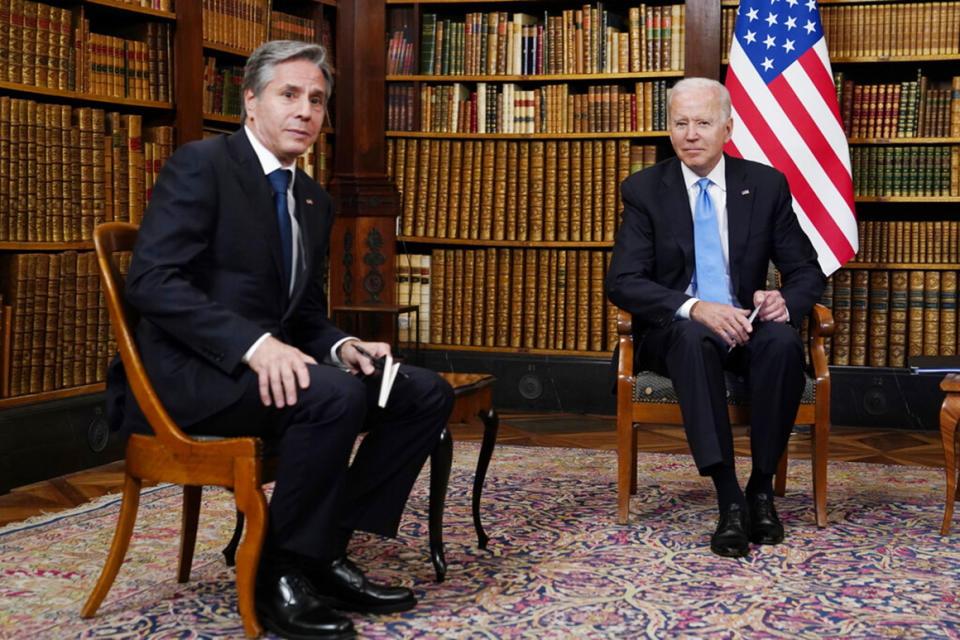Biden sums up his meeting with Putin: ‘This is not about trust’
- Oops!Something went wrong.Please try again later.
- Oops!Something went wrong.Please try again later.
GENEVA, Switzerland — President Joe Biden and Russian President Vladimir Putin both described their highly anticipated summit meeting on Wednesday as an amicable and constructive affair, but they offered few signs of progress in the U.S.-Russia relationship and made clear there was little trust between the two countries.
At a pair of solo news conferences on Wednesday evening, Biden and Putin claimed to have gotten along fairly well during their hours of conversation with senior aides. Still, Biden emphasized that only Russia's future actions would prove whether Putin heard the message the American president traveled to Geneva to deliver.
"It was important to meet in person so there could be no mistake about or misrepresentations about what I wanted to communicate. I did what I came to do," Biden said.
"This is not about trust. This is about self-interest and verification of self-interest," he added, later citing an "old expression" to paraphrase his post-summit outlook: "The proof of the pudding is in the eating. We're going to know shortly."
Despite his wait-and-see approach, Biden had little patience for questions about his level of faith in Putin to curb Russia's malign activities. "I'm not confident he's going to change his behavior. What the hell? What do you do all the time?" the president told a reporter at the conclusion of his news conference, wagging his finger.
On the airport tarmac a half-hour later, before departing Geneva, Biden walked to the press pool to apologize for being "such a wise guy with the last answer I gave."
As for his interpersonal communication with Putin, Biden said the "tone" of the summit was "good" and "positive," and that "there wasn't any strident action taken" by either the U.S. or Russian delegation.
"Where we disagreed, I disagreed — state it where it was. Where he disagreed, he stated," Biden said. "But it was not done in a hyperbolic atmosphere. That is too much of what's been going on."
Putin similarly said he did not “think there was any kind of hostility” in his dealings with Biden: “On the contrary, our meeting was obviously a fundamental one. Many of our joint positions are divergent. But nevertheless, I think that both sides manifested a determination to try and understand each other and try and converge our positions.”
Putin also deemed Biden a “very experienced politician” and repeatedly characterized their talks as “very constructive.”
One of the few areas where the two leaders appeared to make headway was in agreeing that the ambassadors of their respective countries should return to their diplomatic posts “and take up their functions” in Moscow and Washington, Putin said. But “it’s a technical question as to exactly when that will happen — tomorrow, day after tomorrow or whatever,” he added.
Meanwhile, Biden touted Putin's agreement to a "bilateral Strategic Stability Dialogue" intended to "lay the groundwork for future arms control and risk reduction measures," according to a joint statement from Biden and Putin released by the White House.

On most other issues, Putin remained unyielding. He defended Russia’s imprisonment of opposition leader Alexei Navalny — refusing to refer to the prominent Kremlin critic by name — and accused the U.S. of hypocrisy in seeking to root out Moscow’s human rights abuses.
“He consciously ignored the requirements of the law,” Putin said of Navalny. “The gentleman in question went abroad for treatment. His registration was not asked for. As soon as he got to the hospital, he shared his videos on the internet, but he ignored the demands of the laws. And knowing about that, he came back to Russia. And so I take it that he wanted consciously to break the law.”
Putin told NBC News earlier this week that he could not guarantee Navalny — who was arrested after returning to Russia from Germany in January following his recovery from poisoning with a nerve agent — would leave prison alive.
At another point in his news conference on Wednesday, Putin launched into a diatribe against violence perpetrated by the U.S., urging reporters to “look at the streets of America,” where “every single day there are shootings and killings.” He also referenced the killing of “civilians in Iraq” and asked, “What about Guantanamo?”
Pressed on his own efforts to quash dissent in Russia, including alleged assassinations of political opponents, Putin invoked the Jan. 6 insurrection and the case of Ashli Babbitt, the 35-year-old woman who was shot and killed by U.S. Capitol Police as she stormed the Capitol.
“On the question of who is murdering whom, people rioted and went into the Congress in the U.S. with political demands,” Putin said, adding: “Many countries are going through exactly what we’re going through. Let me just repeat. We sympathize with what was happening in the states, but we do not wish that to happen in Russia.”
Biden responded to those remarks by Putin at his own news conference: "I think that's a ridiculous comparison."
The total length of the summit seemed to fall short of the expectations of U.S. officials, who had previewed roughly four to five hours of discussions. After a roughly hour-and-a-half initial session between Biden, Putin and their respective countries’ top diplomats, their bilateral meeting was expanded to include a broader group of top officials from Washington and Moscow.
At their first appearance together on Wednesday, Biden and Putin flanked Swiss President Guy Parmelin at the front door of the historic Villa La Grange, remaining stone-faced as their host welcomed them to “the city of peace” — where Ronald Reagan and Mikhail Gorbachev held their first Cold War-era summit in 1985.
Putin — who has in the past shown a proclivity for leaving world leaders waiting — was notably punctual, arriving at the summit site 15 minutes before Biden, according to schedule.
“I wish you both a fruitful meeting in the interest of your two countries and the world,” Parmelin said, stepping away and allowing the two leaders to greet one another. Biden and Putin locked eyes, shook hands and appeared to exchange brief pleasantries before heading into the massive estate situated on the banks of Lake Geneva.
Biden and Putin were seen again a few minutes later — seated next to Secretary of State Antony Blinken and Russian Foreign Minister Sergey Lavrov, respectively — inside what appeared to be a vast library within the villa. A globe was positioned directly between the two leaders, with large American and Russian flags erected on either side.
Their remarks were difficult to make out over the din of assembled journalists, but Putin thanked Biden “for the initiative to meet today” and said he hoped their summit “will be productive.” Biden, in turn, responded: “As I said outside, I think it’s always better to meet face-to-face.”
The four men, accompanied by translators, were mostly expressionless throughout the photo opportunity, although Biden did crack a smile as reporters jostled for better positions.
The throng of press covering the summit quickly devolved into a chaotic scene, with Russian security shoving members of the media while reporters and White House officials screamed at Putin’s forces for their treatment of the journalists. One Russian media outlet, the state-owned RIA Novosti, blamed the scuffle on its U.S. counterparts, falsely reporting that “American journalists staged a stampede.”
Amid the confusion, Biden appeared to nod in the affirmative when asked by a reporter whether he trusted Putin. But White House press secretary Jen Psaki said in a subsequent statement that Biden simply “gave a general head nod in the direction of the media. He wasn’t responding to any question or anything other than the chaos.”
Following the initial meeting of Biden, Putin, Blinken and Lavrov, the two leaders were joined by four additional aides for an expanded second session. The U.S. delegation included National Security Adviser Jake Sullivan, Under Secretary of State for Political Affairs Victoria Nuland, U.S. Ambassador to Russia John Sullivan and National Security Council Russia director Eric Green.

Back home, the president has continued to face criticism from Republicans that the summit, first proposed by Biden, rewards Putin and elevates Russia to the same diplomatic playing field as the U.S. Even some Democrats urged Biden to take a tougher line.
The White House had said it did not not expect the summit to produce any major policy agreements, but argued it is the first step toward establishing a “stable, predictable” relationship with Russia and a personal dialogue between the two men, who last met a decade ago.
Biden, a former chairman of the Senate Foreign Relations Committee who often boasts of his expertise in diplomacy, has long expressed a distrust of Putin on the world stage.
“We’re not expecting a big set of deliverables out of this meeting,” the administration official said. “I think we expect that there will be areas where the presidents will task out further work to their teams.”
In recent weeks, Putin has continued to face allegations that he has amassed troops along the Ukrainian border, allowed Russian actors to engage in cyberaggressions, cracked down on political dissent and signed deals with Iran to provide them with satellite technology.
The Biden administration has imposed sanctions, but members of both parties want him to do more on the Nord Stream 2 pipeline nearing completion, which will bring natural gas from Russia to Germany under the Baltic Sea.
The last four presidents have sought to re-engage with Russia to varying degrees and with limited success. George W. Bush infamously said he had looked Putin in the eye and peered into his soul. Barack Obama dubbed his attempt a reset. In 2018, Donald Trump provoked a firestorm for blindly accepting Putin’s denial of election interference — countering multiple assessments by U.S. intelligence agencies — when the two leaders met in Helsinki.
The summit on Wednesday came on the final day of Biden’s week-long trip to western Europe, during which U.S. allies in the G-7, NATO and the European Union welcomed him warmly following four years of Trump’s “America First” policies. Biden consulted other world leaders about his meeting with Putin and prepped for the bilateral session with Blinken, Sullivan and other policy experts.
Nahal Toosi contributed to this report.

